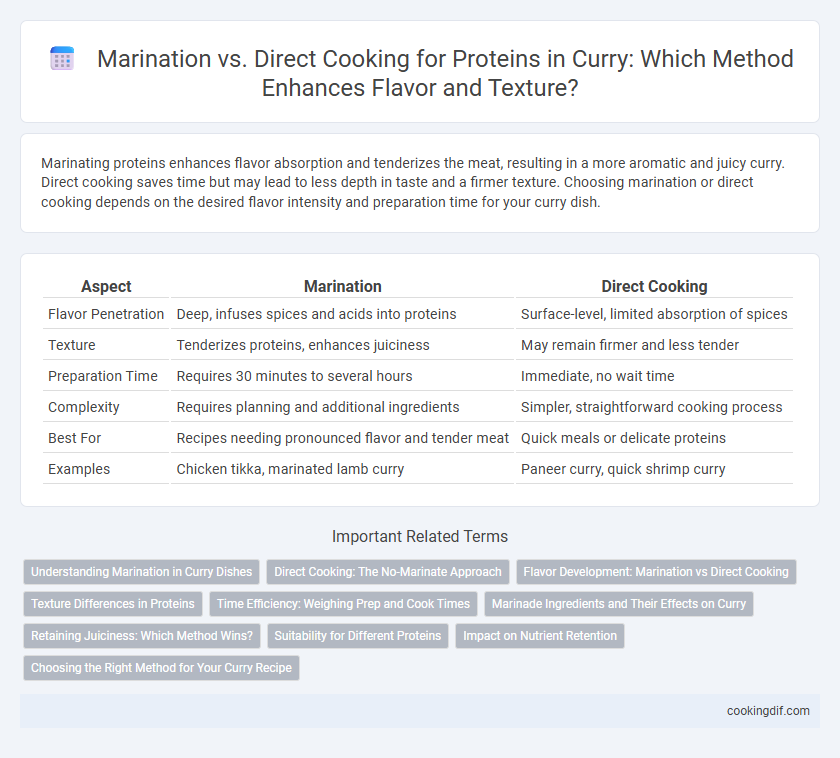Marinating proteins enhances flavor absorption and tenderizes the meat, resulting in a more aromatic and juicy curry. Direct cooking saves time but may lead to less depth in taste and a firmer texture. Choosing marination or direct cooking depends on the desired flavor intensity and preparation time for your curry dish.
Table of Comparison
| Aspect | Marination | Direct Cooking |
|---|---|---|
| Flavor Penetration | Deep, infuses spices and acids into proteins | Surface-level, limited absorption of spices |
| Texture | Tenderizes proteins, enhances juiciness | May remain firmer and less tender |
| Preparation Time | Requires 30 minutes to several hours | Immediate, no wait time |
| Complexity | Requires planning and additional ingredients | Simpler, straightforward cooking process |
| Best For | Recipes needing pronounced flavor and tender meat | Quick meals or delicate proteins |
| Examples | Chicken tikka, marinated lamb curry | Paneer curry, quick shrimp curry |
Understanding Marination in Curry Dishes
Marination in curry dishes enhances protein by infusing flavors through acidic or enzymatic components like yogurt, lemon juice, or spices, which tenderize the meat and allow deeper spice penetration. Direct cooking skips this process, often resulting in less tender textures and subtler flavor absorption. Understanding the chemical interactions during marination is crucial for achieving rich, well-rounded taste profiles and optimal protein tenderness in curries.
Direct Cooking: The No-Marinate Approach
Direct cooking of proteins in curry preserves the natural texture and enhances the authentic flavor profile without the wait time required for marination. High-heat methods such as sauteing or searing allow proteins like chicken, lamb, or paneer to lock in moisture quickly, resulting in a tender and juicy outcome. This no-marinate approach suits recipes with bold spices and rich gravies that infuse deep taste during the cooking process itself.
Flavor Development: Marination vs Direct Cooking
Marination enhances flavor development by allowing proteins to absorb spices, herbs, and acidic components deeply over time, resulting in a more complex and tender taste profile. Direct cooking imparts immediate, surface-level flavors but often lacks the depth achieved through prolonged marination. Proteins marinated for at least 30 minutes to several hours release intensified aromatic compounds, maximizing curry flavor infusion.
Texture Differences in Proteins
Marination enhances protein texture by breaking down muscle fibers and infusing moisture, resulting in tender and juicy bites, especially in tougher meats like chicken or beef. Direct cooking without marination can lead to a firmer, sometimes tougher texture as the proteins contract quickly under heat, often causing dryness in lean cuts. Choosing marination affects the final curry's mouthfeel significantly, delivering a succulent experience compared to the chewier outcome of direct cooking.
Time Efficiency: Weighing Prep and Cook Times
Marination enhances flavor and tenderness in curry proteins but requires extended prep time, often several hours to overnight. Direct cooking saves time by allowing proteins to be added immediately, reducing total meal preparation significantly. Balancing marination benefits with quick cooking methods is essential for optimizing overall time efficiency in curry preparation.
Marinade Ingredients and Their Effects on Curry
Marination enhances curry by tenderizing proteins and infusing complex flavors through ingredients like yogurt, lemon juice, garlic, and spices such as cumin and coriander. Acidic elements in the marinade break down muscle fibers, improving texture, while aromatic spices and herbs penetrate deeply to enrich the overall taste profile. Direct cooking may save time but often results in less tender meat and diminished flavor depth compared to the transformative effects achieved by marinating proteins before adding them to the curry.
Retaining Juiciness: Which Method Wins?
Marination significantly enhances protein juiciness by allowing flavors and moisture to penetrate deeply, preserving tenderness during cooking. Direct cooking can result in a drier texture as heat rapidly seals the surface, often causing moisture loss. For curries, marination is preferable to retain succulent, flavorful proteins that meld seamlessly with spices.
Suitability for Different Proteins
Marination enhances the tenderness and flavor of tougher proteins like chicken, lamb, and beef by allowing spices and acids to penetrate the meat fibers, making them ideal for slow-cooked curries. More delicate proteins such as fish and seafood benefit from direct cooking methods to preserve their texture and avoid over-softening. Choosing marination or direct cooking depends largely on the protein's texture and cooking time requirements, ensuring optimal flavor infusion and mouthfeel in curry dishes.
Impact on Nutrient Retention
Marinating proteins before cooking enhances nutrient retention by preserving vitamins and minerals through a protective layer that reduces nutrient loss from heat exposure. Direct cooking often leads to greater nutrient degradation, especially water-soluble vitamins like B and C, due to prolonged high-temperature exposure. Using acidic and enzymatic marinades can further improve protein tenderness and nutrient absorption during curry preparation.
Choosing the Right Method for Your Curry Recipe
Marinating proteins for curry enhances flavor absorption and tenderizes the meat, making it ideal for tougher cuts like chicken thighs or lamb. Direct cooking suits quicker meals or delicate proteins such as fish, preserving their texture and freshness. Selecting the right method depends on the protein type and desired flavor intensity, ensuring a balanced and rich curry experience.
Marination vs Direct cooking for proteins Infographic

 cookingdif.com
cookingdif.com